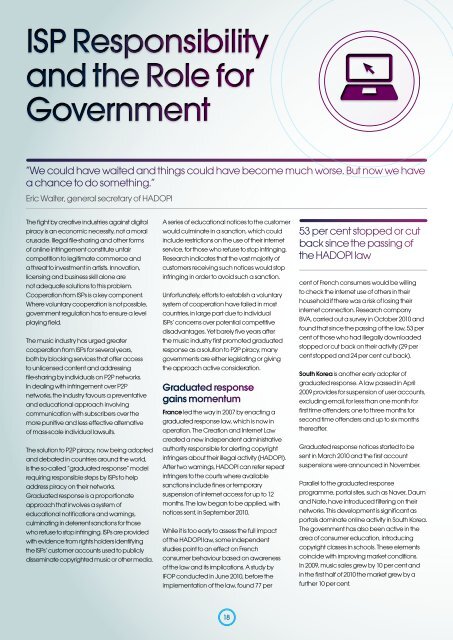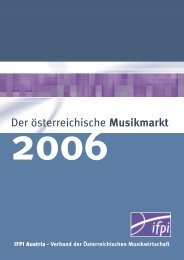IFPI Digital Music Report 2011
IFPI Digital Music Report 2011
IFPI Digital Music Report 2011
You also want an ePaper? Increase the reach of your titles
YUMPU automatically turns print PDFs into web optimized ePapers that Google loves.
ISP Responsibility<br />
and the Role for<br />
Government<br />
“We could have waited and things could have become much worse. But now we have<br />
a chance to do something.”<br />
Eric Walter, general secretary of HADOPI<br />
The fight by creative industries against digital<br />
piracy is an economic necessity, not a moral<br />
crusade. Illegal file-sharing and other forms<br />
of online infringement constitute unfair<br />
competition to legitimate commerce and<br />
a threat to investment in artists. Innovation,<br />
licensing and business skill alone are<br />
not adequate solutions to this problem.<br />
Cooperation from ISPs is a key component.<br />
Where voluntary cooperation is not possible,<br />
government regulation has to ensure a level<br />
playing field.<br />
The music industry has urged greater<br />
cooperation from ISPs for several years,<br />
both by blocking services that offer access<br />
to unlicensed content and addressing<br />
file-sharing by individuals on P2P networks.<br />
In dealing with infringement over P2P<br />
networks, the industry favours a preventative<br />
and educational approach involving<br />
communication with subscribers over the<br />
more punitive and less effective alternative<br />
of mass-scale individual lawsuits.<br />
The solution to P2P piracy, now being adopted<br />
and debated in countries around the world,<br />
is the so-called “graduated response” model<br />
requiring responsible steps by ISPs to help<br />
address piracy on their networks.<br />
Graduated response is a proportionate<br />
approach that involves a system of<br />
educational notifications and warnings,<br />
culminating in deterrent sanctions for those<br />
who refuse to stop infringing. ISPs are provided<br />
with evidence from rights holders identifying<br />
the ISPs’ customer accounts used to publicly<br />
disseminate copyrighted music or other media.<br />
A series of educational notices to the customer<br />
would culminate in a sanction, which could<br />
include restrictions on the use of their internet<br />
service, for those who refuse to stop infringing.<br />
Research indicates that the vast majority of<br />
customers receiving such notices would stop<br />
infringing in order to avoid such a sanction.<br />
Unfortunately, efforts to establish a voluntary<br />
system of cooperation have failed in most<br />
countries, in large part due to individual<br />
ISPs’ concerns over potential competitive<br />
disadvantages. Yet barely five years after<br />
the music industry first promoted graduated<br />
response as a solution to P2P piracy, many<br />
governments are either legislating or giving<br />
the approach active consideration.<br />
Graduated response<br />
gains momentum<br />
France led the way in 2007 by enacting a<br />
graduated response law, which is now in<br />
operation. The Creation and Internet Law<br />
created a new independent administrative<br />
authority responsible for alerting copyright<br />
infringers about their illegal activity (HADOPI).<br />
After two warnings, HADOPI can refer repeat<br />
infringers to the courts where available<br />
sanctions include fines or temporary<br />
suspension of internet access for up to 12<br />
months. The law began to be applied, with<br />
notices sent, in September 2010.<br />
While it is too early to assess the full impact<br />
of the HADOPI law, some independent<br />
studies point to an effect on French<br />
consumer behaviour based on awareness<br />
of the law and its implications. A study by<br />
IFOP conducted in June 2010, before the<br />
implementation of the law, found 77 per<br />
53 per cent stopped or cut<br />
back since the passing of<br />
the HADOPI law<br />
cent of French consumers would be willing<br />
to check the internet use of others in their<br />
household if there was a risk of losing their<br />
internet connection. Research company<br />
BVA, carried out a survey in October 2010 and<br />
found that since the passing of the law, 53 per<br />
cent of those who had illegally downloaded<br />
stopped or cut back on their activity (29 per<br />
cent stopped and 24 per cent cut back).<br />
South Korea is another early adopter of<br />
graduated response. A law passed in April<br />
2009 provides for suspension of user accounts,<br />
excluding email, for less than one month for<br />
first time offenders; one to three months for<br />
second time offenders and up to six months<br />
thereafter.<br />
Graduated response notices started to be<br />
sent in March 2010 and the first account<br />
suspensions were announced in November.<br />
Parallel to the graduated response<br />
programme, portal sites, such as Naver, Daum<br />
and Nate, have introduced filtering on their<br />
networks. This development is significant as<br />
portals dominate online activity in South Korea.<br />
The government has also been active in the<br />
area of consumer education, introducing<br />
copyright classes in schools. These elements<br />
coincide with improving market conditions.<br />
In 2009, music sales grew by 10 per cent and<br />
in the first half of 2010 the market grew by a<br />
further 10 per cent.<br />
18



